Shadow of Mordor was a game that almost sold me on the next gen consoles. I knew I was going to need a PS4 for Bloodborne, and I was very tempted to buy one early so that I could play Mordor. The central game mechanic of orc NPCs fighting amongst each other in order to become Sauron's personal favorite sounded like an interesting mechanic for organic story-telling. It was a concept that sounded like something truly deserving of the name "next gen". The biggest thing that held me back was the fact that the game was also available on last-gen consoles, so I figured it probably wasn't pushing any serious boundaries of game design.
Bat-Assassin's Creed: Arkham Middle Earth
The basic gameplay is highly derivative of Assassin's Creed and the Batman Arkham games. It ports both of these feature sets more or less as competently as those original games, including the same perks and problems. The free running feature suffers from the same lack of control that plague's Assassin's Creed, in that it's sometimes hard to predict exactly where the character will land, and he loves to climb up a wall if you run too close to it. Is it really that hard to allocate a dedicated "climb" or "jump" button?! In Mordor's defense, every button on the controller is mapped to something, so at least it has an excuse (unlike Assassin's Creed with its redundant jump button).
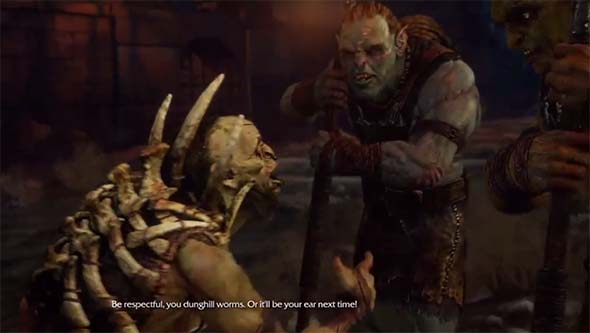
The martial culture of the orcs means that when they find a dead comrade,
they assume he was murdered by an ambitious peer, leaving the player off-the-hook.
Stealth mechanics work pretty well; although the orcs are a bit oblivious to my movements through the game world. Sometimes, I can be moving right across their field of vision within 10 feet of them, but because I'm crouched or hanging off a wall, they just don't see me. Orcs don't care much about each other. Their martial culture means that when they find a fellow orc dead, they assume that he was killed due to his own stupidity, or in a brawl / duel with another orc. This removes the need to drag and dispose of bodies while also masking the fact that orcs don't look for the player when they find a dead body. There are examples of stealth games in which enemy guards don't notice or care about dead bodies that they find, and that's always immersion-breaking. Shadow of Mordor cleverly turns what could have been an immersion-breaking limitation of the A.I. into an appropriate element of the world and narrative. As long as they don't actually see you kill their fellow orc, you can rest assured that throwing an archer off a ledge won't alert any guards who pass below to your presence.
Combat mechanics are almost identical to Arkham Asylum, except you have an ethereal bow instead of all the gadgets or grappling hook. But it also blends some elements of Assassin's Creed insta-kills into the fighting mechanics as well. Fights are much more challenging than in Assassin's Creed because you can't insta-kill enemies when you parry them. Instead, you can stun them and then perform an execution or coup de grace, but you're not impervious during this time. You have to time your coup de graces appropriately in order to avoid being hit in the middle of slitting a prone orc's throat. There are insta-kill special attacks that behave a bit more like Assassin's Creed's counter kills, but you have to build up a combo streak before they become available.
Executing a coup de grace [LEFT] on a single orc in a mob requires split-second precise timing.
Or you can perform a combat execution [RIGHT] mid-combo if you get your hit streak high enough.
Attacks are fluid, controls are responsive, timing is tight, and you can counter or dodge out of any single attack or action. This all combines to give the player a tremendous sense of control as long as you are patient and deliberate in your button-pressing. The strict timing will severely punish you for button-mashing, which makes the combat challenging and satisfying throughout the game.
But the game also throws some bones to the player by providing the ability to save yourself from death. When you're health is critical, attacks from orcs will knock you prone and trigger a pseudo-quicktime event that requires you to move the analog stick into a circle and then press a specific button prompt. Succeeding will allow you to parry the attack, save yourself from death, and sometimes even counter with your own killing blow. Failure will result in your death. This save feature can be very difficult with certain enemies that have narrow margins for error, but most enemies will provide you with very reasonable opportunities for saves.
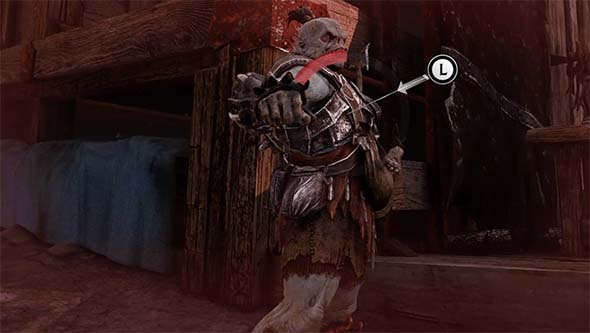
The death save feature gives you a second chance if brawls go awry.
Sauron's Army tells a story that is better than Monolith's scripted one
Despite the ability to save yourself from death, you will still die repeatedly. Much like Demon's Souls, your deaths are written into the game's narrative. The basic premise is that your character, Talion, is cursed and possessed by an elven wraith, and can only break the curse by defeating the specific agent of Sauron who cursed him. Since he's already dead, dying doesn't force a restart from a checkpoint. Instead, the orc that killed you gets a promotion and you respawn to fight again.
And this is where the game really starts to get interesting. The game tracks up to twenty-five orc "captains", each being a named-procedurally-generated character. As you kill the captains, new, randomly-generated ones may appear to take their places. But if any orc kills you, he gets a promotion. In the case of a captain killing you, his power level goes up, and he may increase to a higher rank that gives him more authority in Mordor. If a nameless orc grunt from a mob kills you, then he is suddenly given a name and becomes an orc captain with a set of strengths, weaknesses, and a job to guard a particular region of Mordor.
These various orc captains are in a constant power struggle with each other to move up the ranks, and whenever the player dies, they all perform various activities to move up the ladder towards becoming one of the five prestigious warchiefs. They can duel each other, move up to fill a spot vacated by an orc you slew, or gain power through other means. You can even interrupt their various plots as a side quest activity in order to prevent them from going up in rank or to ensure that specific orcs survive duels and get promoted.
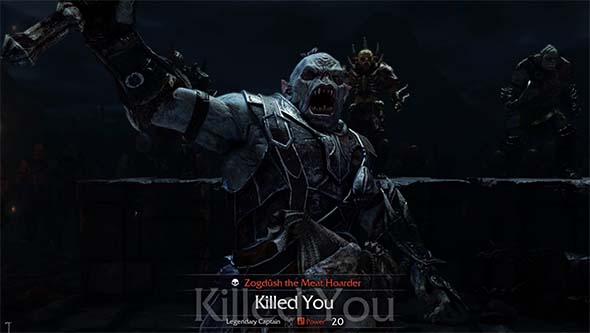
Uruk captains can level up and get promoted by killing the player character.
Why would you ever want to help an orc? Well, your wraith powers eventually allow you to control the minds of certain enemies. Using this power, you can insert sleeper agents into the orc hierarchy that can benefit you in various ways. One such sleeper agent, names Ratbag, is provided by the game's story, and much of the early narrative revolves around the player helping Ratbag to obtain and then hold power as a warchief. You can also help a weaker orc to defeat a tougher orc that you haven't been able to defeat on your own, or who has repeatedly killed you.
In addition to being able to control the minds of sleeper agents, you can also use your mental powers to interrogate certain orcs in order to gain intel about any of the captains. This intel will include the captain's position in the world, and a list of various strengths and weaknesses that you can exploit in combat with them. These traits may include a fear of caragors or other animals (the sight of which may cause the captain to run away in fear), vulnerabilities or resistances to certain attacks and maneuvers, special attacks that they can use in combat, and so on. You can also gain intel by exploring the world for documents, but that isn't as fun.
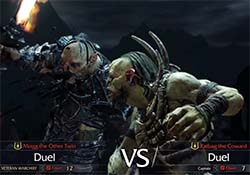
Ratbag acts as a story-critical sleeper agent.
This constant shuffle of ambitious orcs working against each other serves to create an organically-developing side story that is actually more interesting than the game's scripted narrative. The orcs each have unique dialogue for when you encounter them, and many of them will refer back to previous encounters that you may have had with them. This may include them mocking you if they had previously beaten you. Being mocked by an orc and watching him level up and get promoted up the hierarchy actually serves to make things kinda personal.
The only thing they are missing is insulting my mother, but since orcs don't have mothers, maybe they never developed the fine art of "your mamma" jokes. Even ambient dialogue as you sneak past orc mobs sitting around a campfire will refer to the recent deaths or promotions of certain captains, which provides a sense of feedback of your accomplishments (or failures) and makes the whole world seem much more alive and robust. The orcs themselves are also very expressive, detailed, and visually varied. You can see the terror in their eyes when you interrogate them with your wraith mind-control powers; and you can see the twinkle in their eyes when they celebrate your death. It's just too bad that the orcs don't have any witty things to say during actual combat.
![Middle Earth: Shadow of Mordor - sleeper agent]()
Power struggles within the orc hierarchy create an organically-developing side story
that is actually more interesting than the game's weak scripted narrative.
[SCREEN: Sleeper agent with an orc rival]
The first couple hours with the game were blissful. Exploring the map, sneaking around killing orcs, gaining those first chunks of intel, and assassinating the first few captains all flowed smoothly and worked great at the beginning of the game. It was all going almost perfectly! By the time that I had gotten to the point where Ratbag is promoted to a warchief, the game started to show its rough edges. Fortunately, the game remains compelling well after this point due to its tight mechanics and the ever-changing nature of the game world. Upgrades are also very useful and fun to play around with, so completing side quests to gain experience never feels like a waste of time once you progress far enough into the story to unlock the bottlenecks that keep you from the better abilities.
Another overly-compact overworld map
The tough and strict combat mechanics really encourage the player to try to take advantage of the intel that you gain. Drawn-out brawls with captains and their bodyguards will often result in hordes of orc reinforcements arriving and surrounding you, which can quickly become very difficult - especially once the spear-throwing and shield orcs start showing up. The map is very small and compact, leading to fights quickly spilling over into adjoining captains' territory. If a fight isn't resolved quickly, it is not uncommon for other captains to start joining in. And if you try to retreat to find a health herb (which never seem to be around when you need them), you end up with a conga line of orcs following you that are often too overwhelming to fight. The game is trying so hard to encourage you to isolate the captains and use their weaknesses against them, but the constraints of the map often make that prohibitively difficult.
Now, I want to emphasize something important here: I am not complaining that the map is too small! In fact, the map is actually very well-sized so as to eliminate a lot of tedious backtracking. If it were much bigger, it runs the risk of falling into the same problem that Grand Theft Auto V has, which is that most of the map is just empty space that's never relevant to the game. That isn't a problem here. My complaint is that the map often feels too dense and overcrowded. It's hard to isolate and track a particular captain or intel-spewing worm because there always seem to be other orcs around. So as hard as the game is trying to make you use your stealth tools and intel about orc weaknesses and strengths, you often don't have the room to actually do any of these things.
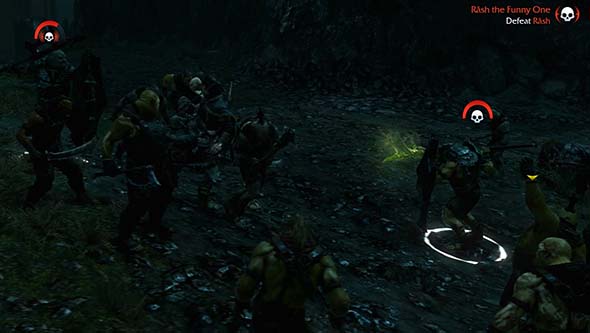
If you can't isolate and quickly dispatch captains, you'll soon be swarmed by orcs, including other captains!
It doesn't help that many events that should be ambient events in the world (such as executions, fights between captains, feasts, and so on) are missions that you have to activate from a specific location. Instead of just wandering into such an event and efficiently resolving it, you have to go to a specific location and trigger a mission, which forces you to do it the way that the game wants you to do it. The whole point of open-world games is for the player to be able to approach problems from different angles and find their own solution. When you keep railroading them into specific paths, you're defeating the whole purpose of the open world design to begin with!
Eventually, the game starts pulling very "game-y" bullshit. You get missions to kill certain enemies in certain ways, but you can't perform those methods at will (since they often require you to get your hit-streak up). So when you have to do something like kill five uruks with a melee finisher, it can get very frustrating. You have to build up your hit meter and then use the special finisher on the specific target without getting hit in the meantime. In these sorts of situations, you have to fight with the fact that it's sometimes difficult to target specific enemies in a mob, and the fact that all enemies except for the named captains don't show health bars. In the process of building up that hit meter, you might accidentally kill the very enemies on whom you are required to perform some special execution. This is rarely a mission fail though, since the game will just spawn more objective orcs - but not always - and now that's just more orcs to kill! But these sorts of things can eventually lead to cheap deaths as you have to fight through wave after wave of orcs because you keep accidentally killing them in the wrong way. I can understand this sort of stuff for bonus challenges, but not as a primary objective in the main questline without a very good justification. A dead orc is a dead orc; what's the difference?!
These sorts of frustrations can bleed over into the passive gameplay as well. There are times when I just want to get some intel from a particular orc, but I end up in a fight and accidentally kill him instead of interrogating him. Now I have to wander the world waiting for another intel opportunity to pop up.
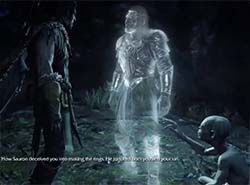
The main story is obfuscated somewhat
by unnecessary fan service.
But despite all these annoyances, I found there to be an addictive quality to the enemy promotion mechanic. It's a very similar addictive element to what is in the FromSoft Souls games - only without the clever sense of constant progression and learning that those games provide. Failing to kill a particular orc and seeing him level up and get promoted makes it kind of personal. I wanted to get back out on the field and put a knife in the little bastard's back. And if he kills you again (thus becoming even stronger), you eventually reach a point where you have to back off and almost concede defeat. "You win this round, but I'll find your weakness and be back."
Grinding will only get you so far, since most skills are locked behind story mission progress. This forces the player to have to take advantage of a powerful enemy's weakness(es), since you can't simply power-level to beat them. The story missions themselves are rather dull. A lot of them involve following NPCs or following glowing footsteps, then performing some combat or stealth task. I kind of feel like the story is a bit loaded with fan service. The over-complicated plot is confusing, and a much simpler and more direct plot about trying to track down the creature that cursed you would have been perfectly serviceable to the game mechanics and design. In fact, the whole plot could have been boiled down to assassinating your way up the uruk chain of command until you reach your ultimate target, gleaning bits of intel about him over the course of the game. In that way, the entire game would have revolved around the uruk hierarchy, and the whole package would have been much more concise and cohesive. Instead, the writers seemed to have gone out of their way to obfuscate the plot in order to have excuses to include characters like Gollum and to link the player character and your wraith companion to Sauron and the One Ring.
Transgenderization
On an awkward note, the developers apparently decided that they wanted more gender equality in the game, so they added the ability to play as a female character named Lithariel. Unfortunately, this is just a reskin of the same character avatar. All cutscenes still show the same [male] Talion character with the same [male] Talion voice and the same story about a man who lost his wife. The female skin is completely superficial and creates a jarring transition from gameplay to cutscene and back. It's a nice thought. I'm a huge supporter of players being able to use or create an avatar that suits them as close as is reasonable within the design scope allowed by the game. I've advocated for female characters in traditionally-masculine sports games, and even for support for left-handed characters in Dark Souls. The implementation in this game just seems lazy.
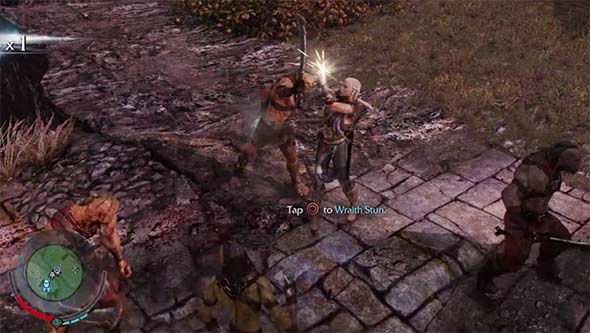
You can play with a female character's avatar, but it doesn't change cutscenes or story at all.
Heavily narrative-driven games, like this, are an exception to my general rule of having customizeable avatars. Talion's gender isn't integrally tied to the narrative other than that he has a wife and child. This isn't like Silent Hill 2 or Lollipop Chainsaw, in which the protagonist's gender is integrally tied into the architecture of the entire game and can't be changed without significant rewrites to the story or alterations to enemies, locations, and general thematic elements. If the developers had planned to have a female avatar from the start, then they should have appropriately budgeted to have alternate cutscenes, dialogue, and voice-acting for the female character. Maybe even substitute Talion's wife for Lithariel's husband in cutscenes and dialogues (although I'm personally fine with Lithariel having a wife). Otherwise, why bother? Instead, why not just give Lithariel a full-blown DLC story and questline of her own, that doesn't overwrite the core game?
This doesn't feel like a genuine effort towards equality; it feels like a lazy attempt at pandering to a female audience (and a teenage boy audience).
A new generation of game design for a new generation of consoles
I'm willing to overlook many of the problems with the game's poor main story and the scaling and density issues of its overworld map because this game really tried to do something new and innovative. This isn't just an "A for effort" kind of sympathy score. The various mechanics and features really do work very well with each other, so the game deserves the praise. Sure the game has a lot of frustrations, but more often than not, they are the good kind of "You got me this time, but I'm gonna try again and beat it" kind of frustrations - the same kind that makes me love FromSoft's Souls games so much. It's difficulty that reinforces the game's overall design and feature set, rather than just acting as a barrier to progress that lazily pads out the game's length.
Shadow of Mordor is the first game on the new generation of consoles that I've played that actually feels like a "next gen" game design (rather than just having shiny, "next gen" graphics) - even though it's available on the last-gen consoles too. The developers showed plenty of restraint in many areas of design so that they could focus on the innovative new feature that everything in the game revolves around. The design is tight and streamlined. They didn't waste the player's time with an excessively large, complicated map, or a multitude of irrelevant mini-games and side quests. And if you're playing on the PS4, then the game has some neat effects that it does with the PS4 controller's built-in speaker. If I had purchased a PS4 sooner in order to play this game, I would not have been disappointed at all.